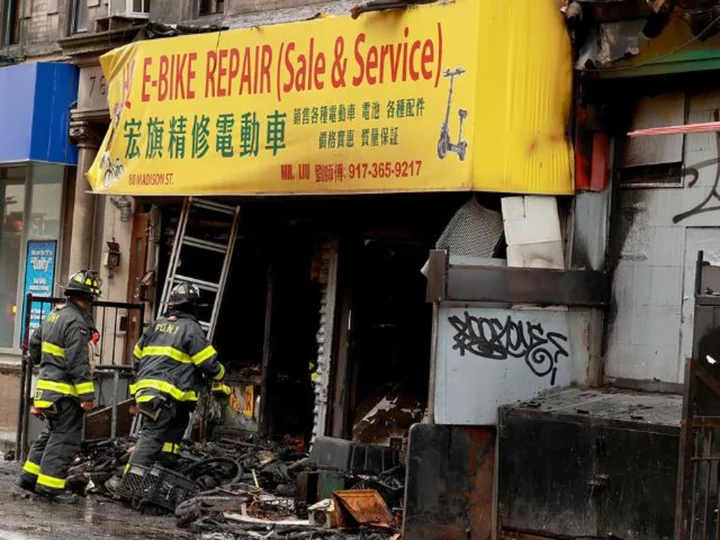The early-morning fire at an e-bike store in lower Manhattan that left four dead was caused by lithium-ion batteries, the city's fire commissioner said Tuesday.
"It is very clear that this was caused by lithium-ion batteries and e-bikes. There is a very large number of both batteries and e-bikes. This location is known to the fire department, we have written violations at this location before, and we have conducted enforcement in this location before," Commissioner Laura Kavanagh said.
Kavanagh called lithium-ion batteries "incredibly deadly" because so much fire is created when they ignite. "It can often be too late, as soon as the fire has begun," she said.
The city's Chief Fire Marshal Dan Flynn said fire officials inspected the store in August and issued summonses for violations related to electrical wiring, charging of batteries, and the number of batteries. The owners of the store were found guilty of the violations and were fined. A reinspection of the property would have been scheduled following the guilty verdict, but the reinspection had not yet occurred, he said.
The same property was also found guilty of violations in 2021, Flynn said.
A group of New York Democrats in April announced support for federal legislation aimed at regulating lithium-ion battery safety standards after a spate of fires caused by the batteries malfunctioning or overheating.
Including Tuesday's fire, there have been 108 fires and 13 fatalities related to lithium-ion batteries in New York City in 2023, Kavanagh said.
How to prevent lithium-ion battery fires
Lithium-ion battery fires are becoming more common for a number of reasons. For starters, lithium-ion batteries are now in numerous consumer tech products, powering laptops, cameras, smartphones and more. They allow companies to squeeze hours of battery life into increasingly slim devices. But a combination of manufacturer issues, misuse and aging batteries can heighten the risk from the batteries, which use flammable materials.
"Lithium batteries are generally safe and unlikely to fail, but only so long as there are no defects and the batteries are not damaged or mistreated," said Steve Kerber, vice president and executive director of Underwriters Laboratory's Fire Safety Research Institute. "The more batteries that surround us the more incidents we will see."
Kerber recommends people buy UL-certified electric bikes and scooters from reputable retailers; online marketplaces often make it hard for customers to tell where products are actually coming from. If a fire occurs, he advised people to evacuate and call 911 immediately rather than trying to put it out themselves.
"The fire spreads incredibly fast and a fire extinguisher is not effective," he said.
Beyond scooters and e-bikes, experts warn anyone with a lithium-ion battery should follow proper charging and battery usage guidelines. According to researchers at the University of Michigan, any device with this kind of battery should be charged and stored in a cool, dry place, and not left charging for too long or while you're asleep -- a recommendation likely at odds with how many consumers handle their devices.
"Elevated temperatures can accelerate degradation of almost every battery component and can lead to significant safety risks, including fire or explosion," the researchers said. "If a laptop or cellphone is noticeably hot while it's charging, unplug it. Minimize exposure to low temperatures, especially when charging."
Batteries should also be routinely inspected to make sure there is no cracking, bulging or leaking, and people should always use the charger that came with the device or use one from a reputable supplier. When charging an electric scooter or bike, Kerber said it should never block a fire escape or exit route.
Although some battery chemistries are safer than others, we are still a few years away from adoption of a better, safer lithium-ion alternative, according to Sridhar Srinivasan, a senior director at market research firm Gartner.
For example, LFP (lithium iron phosphate) batteries don't overheat as much as other types of lithium-ion batteries. Future battery technologies in development, such as sodium-ion or solid-state batteries, are also expected to address some of the safety issues of lithium-ion.

